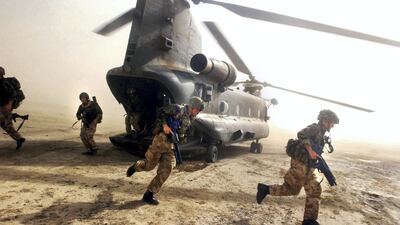The West needs to be less risk averse in the security challenges it faces, with Britain in particular needing to “up its game”, the chairman of the UK House of Commons Defence Committee said.
Conservative MP Tobias Ellwood set out the failings in Britain's defence and security policies that may be addressed by a government review.
The former defence minister said that the world was becoming “very much more dangerous … with a defining condition being chronic instability”.
Mr Ellwood was speaking ahead of next month’s publication of Britain’s defence, security and foreign policy paper, the Integrated Review.
It was launched in December 2019 and billed as a radical reassessment of Britain’s place in the world. Mr Ellwood said that since then the country had gone through a period of “more danger, more threats, more instability than ever since the Cold War”.
He said in an online speech to the Institute for Government that after the wars in Afghanistan and Iraq, the West had become “a little risk averse over the last decade”.
Liberal democracies had to define “what does it mean to be part of the West, what do we stand for, what do we believe in and what are we willing to defend?”
People had to recognise that instability was caused by "growing authoritarianism across the world", with increasing numbers of states "abusing our perhaps outdated international rules-based order to take advantage and pursue their own agendas".
With Whitehall almost exclusively focused on Brexit for the past four years, Mr Ellwood said it was time for Britain to "up its game, because we have been hesitant ourselves".
“Our history, our connectivity, our international reach, our soft and hard power strength have traditionally allowed us to step forward, perhaps when other nations hesitate,” he said.
With Britain hosting both the G7 and COP26 climate summits, it will be back in the global spotlight and the integrated review “will be that statement of intent for us to re-engage on the international circuit”.
He said that with the accord in place between the UAE and Israel, “two of our closest friends in the Middle East”, now comes an opportunity to develop the relationship from a security and prosperity perspective.
While the West is preoccupied with the coronavirus pandemic, Mr Ellwood said that adversaries “aren't going to twiddle their thumbs” and they were “taking advantage of us being distracted”.
“So, all the more reason why we need to be clear what we stand for,” he said.
Instead, Britain has cut its overseas aid budget, its armed forces, has outdated Challenger tanks and will probably buy only a third of the 138 F-35 jets that it intended.
However, Mr Ellwood refuted a suggestion that Britain was a now a middle power.
“Look at our history,” he said. “We provide the thought leadership, we’re the ones that actually understand the world a little bit and provide some of the answers and solutions. And if Britain doesn't do that, which countries are willing to?”

Significant advances in technology, particularly with artificial intelligence and drones, as well as an over-reliance on data, have changed the character of conflict.
States can now conduct cyber attacks below the “threshold of traditional military response”, which raises the question on how western countries should respond.
He said that the potential for Great Power conflict between China, Russia and America was high and the consequences from the coronavirus pandemic would present major challenges for global security.
Mr Ellwood said that the biggest long-term geopolitical and strategic threat was climate change, “which we've not really come to terms with”.



